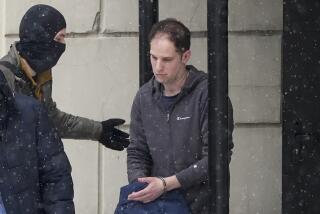Rumors About Gorbachev Fly, Roiling Stocks
- Share via
WASHINGTON — Rumors that Soviet President Mikhail S. Gorbachev might step down as Communist Party chief rocked the U.S. stock market Tuesday and prompted congressional warnings that the size of the defense budget should not depend on “the political life and death of one man.”
Secretary of State James A. Baker III, whose one-day postponement of a trip to Moscow next week seemed to lend credence to an initial television report of Gorbachev’s possible resignation, dismissed it as “just a rumor.”
The secretary of state’s timetable was changed only to let Gorbachev devote more time to a Communist Party Central Committee meeting that would otherwise have overlapped his visit, Baker’s aides said.
Also contributing to the report was a Reuters news service story in which a respected Swedish economist and Soviet expert, Anders Aslund, predicted that the fate of Gorbachev and his reforms will be decided before elections in March for the Supreme Soviet and local offices that the Communists expect to lose, to non-Communist candidates.
“The logic of the situation is that this is when Gorbachev falls from power,” Anders was quoted as saying in a report from Stockholm.
Administration officials said they could find “no credence at all” to a report on Cable News Network that Gorbachev is considering giving up the powerful position of general secretary of the Communist Party.
The CNN report said Gorbachev is expected to keep his other job as president of the largely powerless Congress of Deputies, a legislative body that he created.
“All I can tell you now is that it’s a rumor, and therefore it’s not something I think we should respond to or react to,” Baker told reporters. “We will have a comment if we ever determine that it’s anything more than just a rumor.”
White House Chief of Staff John H. Sununu, who said he had discussed the report with President Bush and National Security Adviser Brent Scowcroft, told reporters that American officials are trying to assess its accuracy and the possible implications.
“We would like to understand the details of what’s involved and what’s implied if such a change has taken place,” he said.
The consensus among U.S. experts on Soviet affairs has been that Gorbachev remains politically strong, although his internal reforms appear to be stagnating or even regressing. As a result, officials discounted the rumor’s accuracy.
But they were reluctant to rule it out completely, in part because Gorbachev’s opposition is concentrated in the party’s 250-member Central Committee, which formally elects--and deposes--party leaders.
The Central Committee is scheduled to meet Monday and Tuesday to discuss the ethnic and national unrest in the Soviet Union, but it could also pass judgment on Gorbachev’s stewardship.
Rumors about Gorbachev giving up one of his two jobs have been circulating in Moscow in various forms for two months, fueled by cascading problems facing the Soviet leader, from ethnic violence in the Caucasus to the stagnating reform program known as perestroika .
On Wall Street, the stock market was so roiled by the Gorbachev report Tuesday that one brokerage firm stopped trading temporarily until calm was restored.
The Dow Jones Industrial Average initially fell in reaction to the Gorbachev rumor but later recovered. It finished down more than 10 points, but analysts attributed the final drop to congressional testimony by Federal Reserve Chairman Alan Greenspan about the economy.
On Capitol Hill, Senate Republican Leader Bob Dole of Kansas criticized what he called a “stampede” by Democrats to cut defense spending because of Gorbachev’s policies.
“Well, the wake-up alarm just sounded in Moscow,” he said. “If anyone is foolish enough to gamble with our national defense based on the political life and death of one man, then we are in deep trouble. We want Gorbachev to succeed, but there are no guarantees (that he will).”
Taking a less partisan line, Indiana Sen. Richard G. Lugar, second-ranking Republican on the Senate Foreign Relations Committee, doubted that Gorbachev would surrender the party post voluntarily.
“The Communist Party has been a very important factor in holding together the Soviet republics . . . (and) the loss of control over the party would be a very serious step for Mr. Gorbachev to take, either voluntarily or involuntarily,” Lugar said.
If the report turns out to be true, Administration officials said, Gorbachev might have decided to “cut his losses” by moving away from the Communist Party, which has lost the trust of the people and is likely to lose in the coming elections.
And since his supporters remain a majority in the ruling Politburo, he could retain effective control of the 20-million-member party, the official said. That would be clearly the case if a Gorbachev supporter took over the job of party chief.
An alternative scenario suggesting that Gorbachev had been pushed out would be apparent if Gorbachev resigned and a conservative were named the new party leader, some officials said.
The CNN report, which cited an anonymous source within the party, said that Gorbachev had been secluded in his country home for eight days and was suffering severe depression because of the turmoil surrounding the violent crackdown by Soviet forces in Azerbaijan.
The Soviet leader had not been seen in public for that period, but he reappeared on television Tuesday holding talks with visiting East German Prime Minister Hans Modrow and appeared in good spirits.
U.S. experts have noted that Gorbachev has been testy and at times autocratic in public in recent months, and they said it would be surprising if the enormous pressure he has been under had not taken an “emotional toll.” But none suggested he was cracking under the strain.
Gorbachev has come under sharp criticism recently from both the political left, which wants him to push reforms faster, and the right, which wants him to consolidate his gains and move more slowly now.
Last month, as the country’s economy worsened rather than improved and as democratization continued to diminish party control, Gorbachev told the Central Committee that he would resign if he ever lost its confidence.
However, Eduard A. Shevardnadze, the Soviet foreign minister and one of Gorbachev’s closest allies in the ruling Politburo, told the Associated Press last week that there was no danger that Gorbachev would be toppled from power and that his opponents “do not really constitute a significant factor.”
Baker will hold talks with Shevardnadze Feb. 7 and 8 in Moscow, mostly on remaining arms control differences. Baker also was expected to meet with Gorbachev, who is scheduled to visit Washington in late June for a summit meeting with President Bush.
Times staff writers Doyle McManus and Michael Ross in Washington contributed to this story. Toth reported from Washington and Parks from Moscow.
More to Read
Get the L.A. Times Politics newsletter
Deeply reported insights into legislation, politics and policy from Sacramento, Washington and beyond. In your inbox twice per week.
You may occasionally receive promotional content from the Los Angeles Times.










